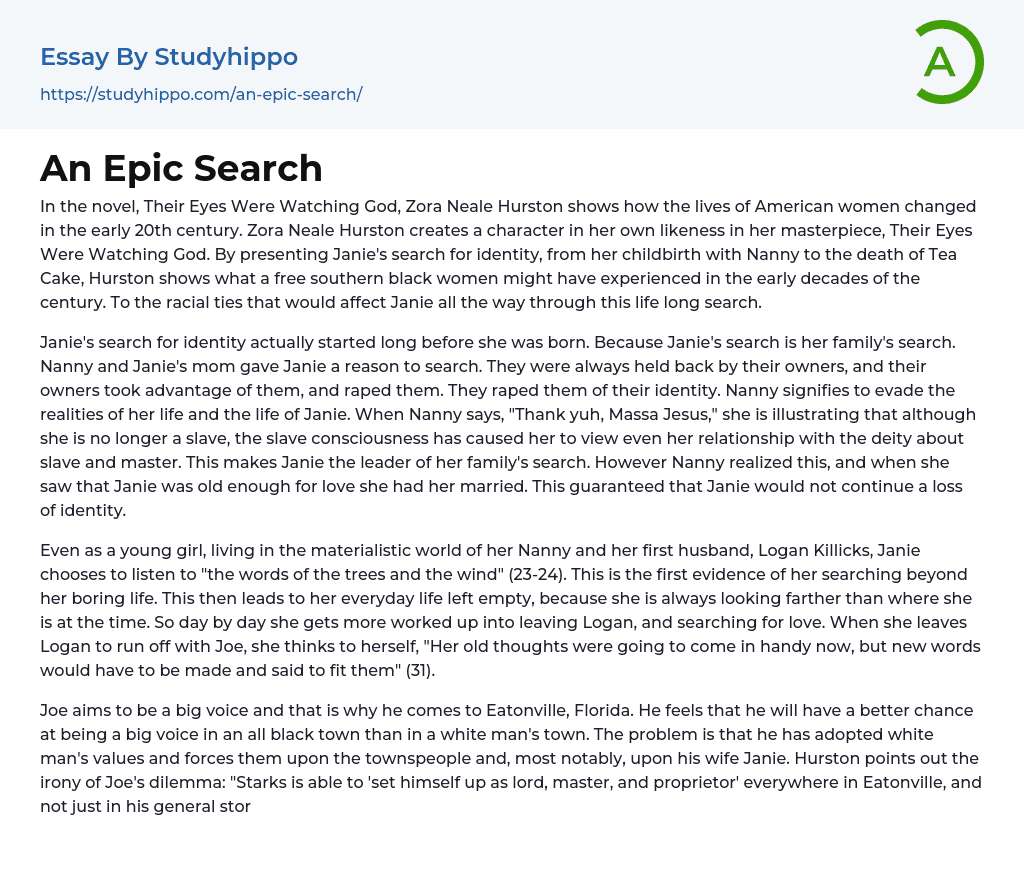Zora Neale Hurston's novel, Their Eyes Were Watching God, explores the transformation of American women in the early 20th century. Through the character of Janie, who mirrors Hurston herself, Hurston illustrates the journey of a Southern black woman in her quest for self-identity. This exploration spans from Janie's relationship with Nanny during her childbirth to the eventual demise of Tea Cake, shedding light on the experiences that a free Southern black woman may have encountered during this period. These experiences are deeply intertwined with racial dynamics that continue to shape Janie throughout her lifelong search for identity.
Janie's quest for self-discovery began even before her birth, as it is intertwined with her family's journey. Nanny and Janie's mother instilled in Janie a purpose to seek her identity. They were constantly restrained
...by their oppressors, who exploited and violated them, stripping away their sense of self. Nanny, in particular, sought to escape the harsh realities of her life and that of Janie by clinging to her faith. By expressing gratitude to "Massa Jesus," she reveals that the mindset of a slave continues to shape her perception of her relationship with a higher power. These circumstances propel Janie into becoming the guiding force in her family's search for identity. Recognizing this, Nanny arranges for Janie to be married as soon as she deems her old enough for love. This guarantees that Janie will not suffer further loss of identity. Even as a young girl living with her materialistic Nanny and first husband, Logan Killicks, Janie chooses to listen to nature's whispers, symbolized by "the words of the trees and the wind." This signifies the beginning of her exploratio
beyond the monotony of her life. Consequently, her daily existence becomes devoid of fulfillment as she is constantly seeking something beyond her present circumstances. Day by day, her desire to leave Logan intensifies as she yearns for love. When she finally escapes with Joe, she acknowledges that her old beliefs will be useful but new words must be created and expressed to truly articulate her journey.Joe comes to Eatonville, Florida with the goal of becoming a prominent figure in the community. He believes that in an all-black town, he will have a better chance of achieving his ambition compared to a predominantly white town. However, despite his aspirations, Joe imposes the values of white people on the townspeople, especially on his wife Janie. Hurston highlights the irony of Joe's predicament, noting that he exercises control and authority over Eatonville similar to how white people have complete institutional control over America. This dynamic becomes another obstacle in Janie's ongoing search for fulfillment. Eventually, their marriage falls apart, leading Janie to realize the need for new thoughts and words. While she continues her search, Joe passes away, marking a significant moment in her journey. As she develops a relationship with Tea Cake, her love for him becomes the strongest yet. Janie expresses to her friend Pheoby that Tea Cake has taught her a whole new way of communicating. It seems like Janie's search is approaching a peaceful resolution. However, it is far from over as Tea Cake falls ill after being bitten by a rabid dog and suspects that Janie wants to leave him for a lighter-skinned man. To ease his fears, Janie suggests that maybe someone
had put a curse on him.In "Ah'll see can't Ah find some mustard seed whilst Ah's out" (166), Janie's quest to discover her true identity, separate from the beliefs she was raised with, correlates to larger concerns that are significant for her entire race. Nanny's notion of Janie living a carefree existence on a porch symbolizes whiteness, thereby degrading the lives of other women and diminishing their racial connections. Janie's straight hair becomes entwined with whiteness, and due to societal hierarchy, her hair represents a source of power that her first two husbands strive against. Only at the end, when Janie finally lets down her hair and denounces Nanny's vision, does she break free from the same constraints that continue to trap others in personal stagnation. Hurston skillfully weaves together these significant issues of her generation in a single compelling novel, while simultaneously depicting one woman's struggle with them.
- Adoption essays
- Aunt essays
- Babies essays
- Bedroom essays
- Caring essays
- Children essays
- Daughter essays
- Divorce essays
- Dog essays
- Dysfunctional Family essays
- Family Tradition essays
- Family Values essays
- Father essays
- Foster Care essays
- Friends essays
- Grandparent essays
- Home essays
- Hometown essays
- Husband essays
- Jealousy essays
- Love essays
- Marriage essays
- Mother essays
- Online Dating essays
- Parenting essays
- Parenting Teens essays
- Parents essays
- Relationship essays
- Room essays
- Sibling essays
- Sister essays
- Wedding essays
- Wife essays
- Caste System essays
- Citizenship essays
- Civil Society essays
- Community essays
- Culture essays
- Deviance essays
- Discourse Community essays
- Female essays
- Filipino People essays
- Igbo People essays
- Indigenous Australians essays
- Indigenous Peoples essays
- Men essays
- Middle Class essays
- Minority Group essays
- Modern Society essays
- Popularity essays




